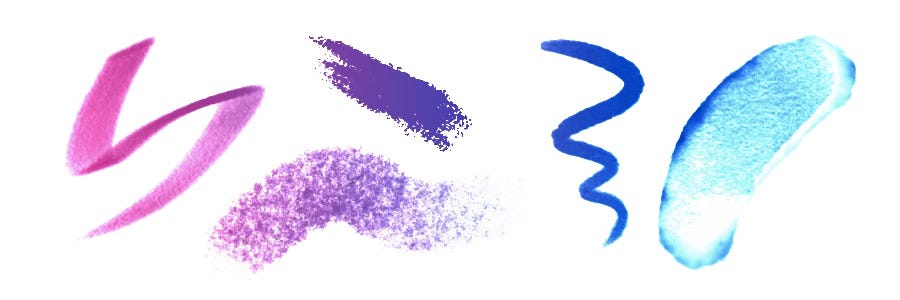(Con)fidence Man
Confidence, arrogance, and objectivity.
I’m really good at making digital brushes. Actually, I’m one of the best.
Is it arrogant for me to write this? Or is it objectively true and therefore fine to state freely? Some people will argue that modesty dictates what we should or should not say about our own strengths, objectivity be damned. Others see no problem with being honest about one’s skills and abilities.
The level of comfort one has with such statements could depend on geography, culture, professional environment, and other factors. It could also simply depend on the context for such statements; writing about my achievement in brush-making here in my own newsletter is different from announcing it on a public bus!
But one thing is true: whether or not you decide to acknowledge your particular strengths and positive attributes publicly, you absolutely must learn to do so privately. Learn to look at yourself in the mirror and state, with certainty and authority, the things you do well.
Otherwise, you fail to build confidence.
Confidence is a necessary ingredient for success in any area of life. So is humility, but if you’re not careful, humility can morph into a kind of imposter syndrome that stops you in your tracks.
(And yes, yes, it’s normal to feel imposter syndrome and I have already written about it, as have thousands of others. Just don’t let it dominate your life!)
I took a train to Stuttgart a couple of weeks ago to watch the fourth round of the Boss Open tennis tournament. It was clear from the moment each player walked onto the court that they were confident they could win. I can’t explain it but something in their body language projected only one thing: belief.
Professional tennis might not seem to have anything in common with illustration, design, photography, or animation. But nobody gets ahead in any of these fields without confidence that they *can* do so.
Additionally, both professional athletes and professional artists have learned to identify and acknowledge their particular strengths and they lean on them to get ahead. In tennis, most players are striving to be good at everything (serve, volley, slice, drop shot, etc.), but they know what they are best at and use it to their advantage.
An important point: in the title of this newsletter, I wrote ‘Con’ in parentheses. This is to call attention to the danger of misplaced confidence. We have all met people who claim to be something they are not. There is a fine line between faking it until you make it and outright lying about your abilities. The former is a story of rising to the occasion and doing your utmost to live up to, or surpass, expectations. The latter is simply cheating others. Therefore, let your confidence arise from results, from the satisfaction of your clients and coworkers, and from a clear understanding of the quality of your work as it compares with the work of others in your field.
When it comes to illustration, I can confidently state that I’m good at storytelling and working with human subjects. I also know I’m fast. Leaning into these strengths made editorial and book illustration a natural fit for me and most of my assignment work landed in those markets.
This knowledge of, and confidence in, my own strengths is important not just because it helps me focus on certain clients or jobs, but because of the growth it promotes. Allow me to explain:
Confidence allows you to work without being hindered by self-doubt or uncertainty. Your clients are happy, they tell you so, and your self-belief grows.
You complete more assignments, your portfolio grows.
Through doing more work that plays to your strengths, these strengths get even stronger and your skills grow.
Bonus: the space previously occupied by self doubt can now be filled with creativity and new ideas … growth, growth, growth!
By the way, working with confidence is not the same as working without objectivity.
You can be confident and still see areas where you should improve. In fact, this balance is required for continued progress. I have met artists who are doing exactly the same kind of work today that they were doing 25 years ago. This work may pay the bills, and it may still be ‘good,’ but I am always curious to know what would have happened if they had pushed themselves outside of their comfort zones.
So, here is your homework for today: share this newsletter (please, and thank you!), then go stand in front of the mirror and tell yourself what you’re good at! Get comfortable with this and do it more often. Then, if you feel like it, say something nice (as long as it’s true!) about your skills in public. This can be done in a non-braggadocious manner, I promise. It just takes practice.
Are you honest with yourself about your strengths?
Big news coming soon and I look forward to writing about it here.
Until then, take care of yourselves and each other, remember to be kind (that includes to yourself!), and I’ll say, Ciao for now.
Kyle (find me here)
PS - speaking of digital brushes, I’m excited about the one I made last week. Yummy!





There's a free training program called 'I Am Remarkable' that originally started at Google. One of the things they teach is "it's not bragging if it's true." It stuck with me! https://www.rmrkblty.org/iamremarkable
Kyle, you have given me another view about imposter syndrome. I feel that a lot and allow my confidence level to drop. I have this idea that "anybody could do this," that has not served me. Thank you!